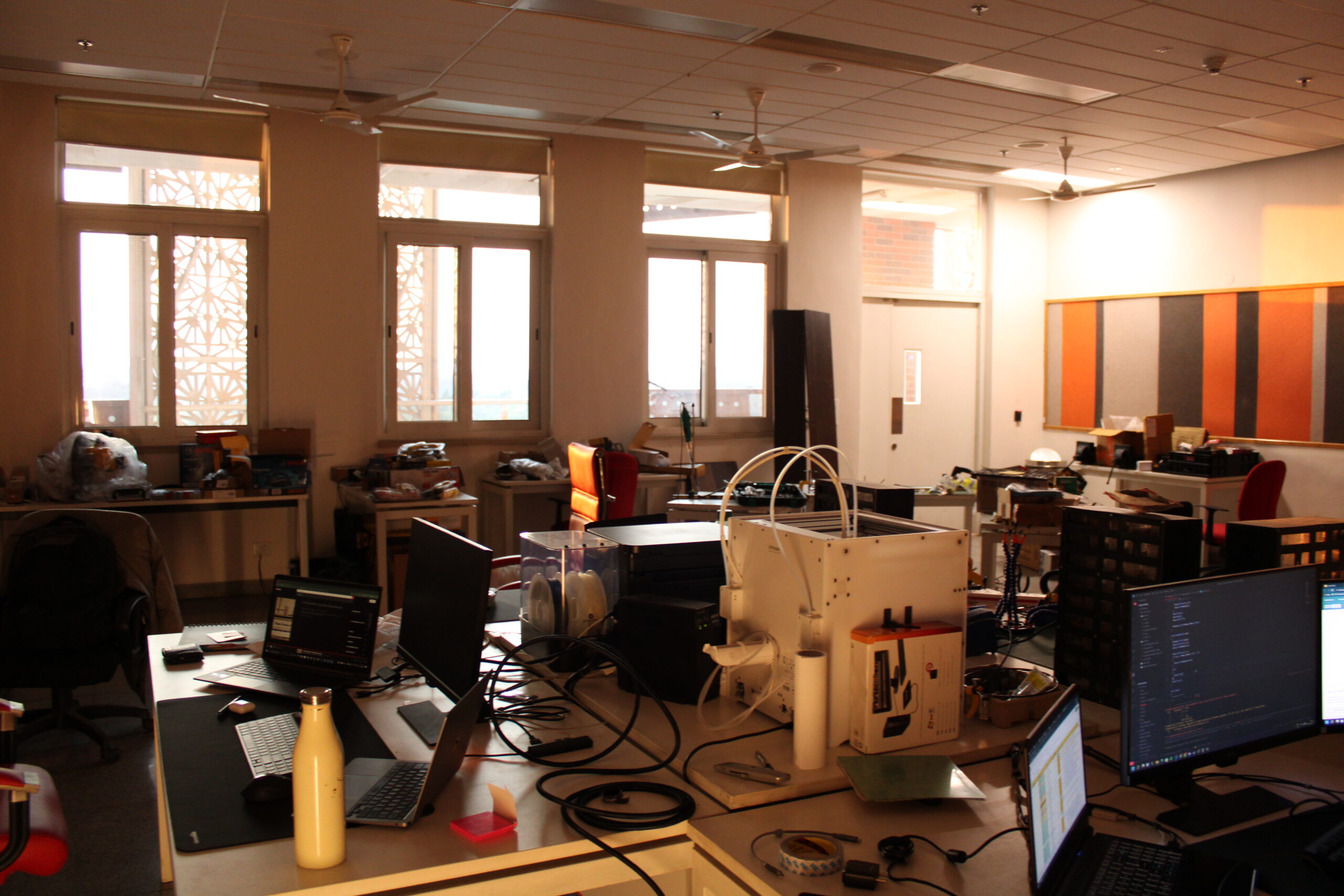The Mphasis AI & Applied Tech Lab at Ashoka is a pioneering collaboration between Ashoka University and Mphasis, blending industry expertise with academic innovation. Established in 2020, the lab fosters an interdisciplinary approach, ensuring computational learning remains accessible and impactful for students and researchers across diverse fields.
At its core, the lab focuses on Artificial Intelligence, Health Analytics, and Cybersecurity, tackling contemporary challenges through cutting-edge research. BharatSim enables large-scale simulations for government and healthcare applications, while CHART (Ashoka Centre for Health Analytics, Research & Trends) aims to bridge India’s healthcare data gap, supporting Universal Health Coverage (UHC). The AI@Ashoka initiative pushes the boundaries of AI/ML, addressing both technological advancements and ethical considerations, while the Cybersecurity pillar ensures secure implementation and drives post-quantum cryptography.
The Digital Makerspace further enriches the lab, serving as a hub for hands-on innovation and experiential learning, equipping students and researchers with tools to design and develop tech-enabled solutions.
In essence, the Mphasis AI & Applied Tech Lab reflects Ashoka University’s vision for an immersive and transformative learning experience, preparing students to navigate the future of technology.
BharatSim is an open-source, large-scale simulation framework designed to model complex socio-economic and environmental systems in India. Led by Dr. Gautam Menon and Dr. Debayan Gupta at Ashoka University, it can simulate 100 million to 1 billion agents, making it India’s most ambitious synthetic population model for policy testing and intervention evaluation. The project is expanding beyond healthcare to incorporate economic and behavioral modeling, with ongoing optimizations to enhance efficiency and accessibility. Collaborations with AIIMS, Johns Hopkins, and NACO demonstrate its real-world impact in public health decision-making. With applications in economics, business logistics, and urban planning, BharatSim is evolving into a powerful interdisciplinary research tool for AI-driven large-scale simulations.

The Centre for Health Analytics Research and Trends (CHART) is focused on the establishment of a strong repository of evidence- based research on a range of issues impacting population health. The multi- disciplinary team of researchers brings expertise in designing and conduct of rigorous epidemiological research studies across India . The team comprises public health experts , epidemiologists, biostatisticians , social scientists, environmental epidemiologists and exposure science experts , geospatial analysts , health economists , health system specialists , nutrition and laboratory science experts .

The Digital Makerspace at Mphasis AI & Applied Tech Lab at Ashoka is an innovation hub equipped with cutting-edge tools, rapid prototyping technologies, and high-performance 3D printers to help turn ideas into reality. It offers workshops, training sessions, and Independent Study Modules on 3D modeling, hardware prototyping, and woodworking to promote project-based learning. Collaboration is central, fostering interdisciplinary partnerships within Ashoka and beyond. With a strong focus on sustainability, inclusivity, and safety, it provides a supportive environment for diverse ideas. Committed to continuous growth, the Makerspace empowers creativity, advances technology, and nurtures lifelong learning.

The AI@Ashoka initiative marks a bold new chapter in Ashoka University’s quest for academic excellence and innovative learning. Led by Prof. Partha P. Chakrabarti, Advisor Computer Science to Ashoka University, and Professor of Computer Science and Engineering at IIT Kharagpur, this initiative is designed to spearhead advancements in Artificial Intelligence (AI) and Machine Learning (ML).

The project being led by Dr. Mahavir Jhawar (Computer Science Department) addresses the urgent need for quantum-resistant cryptographic solutions as quantum computing threatens traditional security methods. Aligned with NIST’s PQC Standardisation Project, it focuses on the security analysis of standardized PQC systems, the challenges of PQC migration, and the development of advanced cryptographic systems for emerging applications. Our research aims to ensure secure implementation, optimize performance, and drive the global transition to post-quantum cryptography. The team actively collaborates with industry partners, publishes in leading journals, and contributes to the cryptographic community.

Introductory Makerspace workshop blends creativity, craft, and electronics
A Makerspace workshop on wearable design and material experimentation
The Hydrodynamics Laboratory combines experimental research with international student opportunities
Makerspace and CLAD collaborate to bring computational design into student-led fashion.
Student team presents climate-focused data innovation at global policy hackathon.
An artistic deep dive into folklore, gender, and tradition with Sangeeta Jawla
